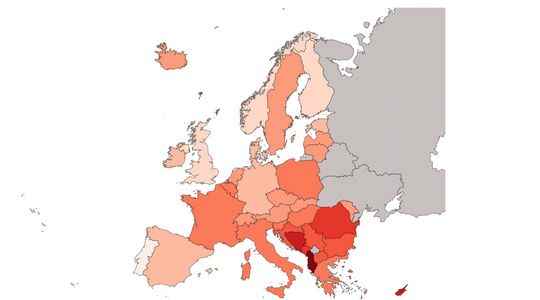On the health side, the European continent is flashing red again: Italy, Greece, Austria, Spain… Daily contaminations have been swelling since June. For the seventh time, the region is affected by yet another wave of the pandemic, driven by the BA.4 and BA.5 sub-variants, while most health restrictions have been lifted. In France, the number of new Covid-19 infections has risen to 154,615 over the past 24 hours, according to data from Public Health France published on Wednesday evening. It was 206,554 the day before.
To view the graph, click here.
In Germany, the proportion of people infected with the virus is also increasing: 89,679 new contaminations on July 6 (on an average of seven days), against 79,584 on June 23. For now, the ruling coalition is navigating by sight on the direction to take. According to a recent expert assessment report, presented on July 1, the effectiveness of anti-Covid measures would be difficult to assess at the moment.
In Belgium, we observe with just as much attention the increase in cases. Between June 25 and July 1, 5,518 new Covid-19 infections were recorded on average per day, up 44% from the previous week, reports the Sciensano Public Health Institute. “Between June 28 and July 4, there were an average of 119 hospital admissions per day related to Covid-19, an increase of 17% compared to the previous reference period”, underlines the Belgian daily. The Free.
A “net” increase in Italy
In Italy, caution remains in order as the number of daily infections linked to Covid-19 has jumped 131% in two weeks. The increase in viral circulation is “clear and consolidated”, noted Franco Locatelli, president of the Superior Council of Health, at the end of June. However, our transalpine neighbors had not loosened the screws, unlike their European neighbours, deciding to extend until the end of the summer the use of FFP2 protections in health structures and retirement homes, as well as in transport (bus, tram, metro and train) of the peninsula. With the exception of planes where wearing a mask is only “recommended”.
Another State which has paid a heavy price during the health crisis, the United Kingdom is watching the resurgence of the epidemic with concern. Levels of Covid-19 infection in the UK have risen by more than 30% in a week, according to official data released as of July 1. The number of infections in the week ending June 25 is found to be the highest since late April. In such a context, some experts have called for a reintroduction of the wearing of masks in certain places.
To view the graph, click here.
For its part, Spain remains cautious by keeping the wearing of a mask compulsory in health establishments, pharmacies, public transport and residences for the elderly. According to the latest report published by the Ministry of Health, Tuesday July 5, the cumulative incidence among people over 60 (the only one measured since the end of March) reached 1,135 cases per 100,000 inhabitants during the last 14 days. People admitted to hospitals with Covid have increased by 13% since last Friday, from 10,249 hospitalizations to 11,586 currently.
Portugal against the tide
In neighboring Portugal, the dynamic is different: the country was hit hard by a new wave of the epidemic last June, and is finally starting to breathe. Between June 21 and 27, Portugal recorded 73,000 new infections, 22,000 less than the previous week. As a reminder, the country had recorded its peak between May 17 and May 23, when 189,000 new cases had been identified.
Another tourist destination, Greece also sees its health indicators turn red: over two weeks, the number of contaminations has increased by 124%, while the country has maintained the obligation to wear a mask “in urban public transport and everywhere else in situations where the rules of distancing cannot apply”, underlines the embassy of France in Greece.
Finally, if contamination remains low, the countries of Eastern Europe are experiencing a sharp increase in the circulation of Covid-19, suggesting a new health peak in the coming weeks.
